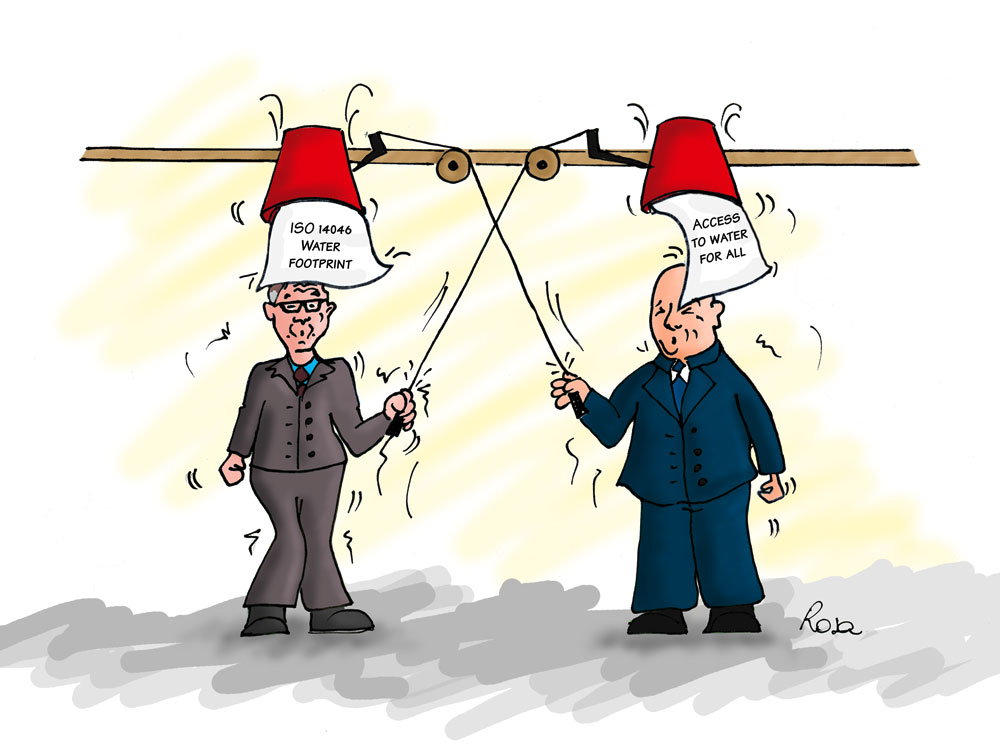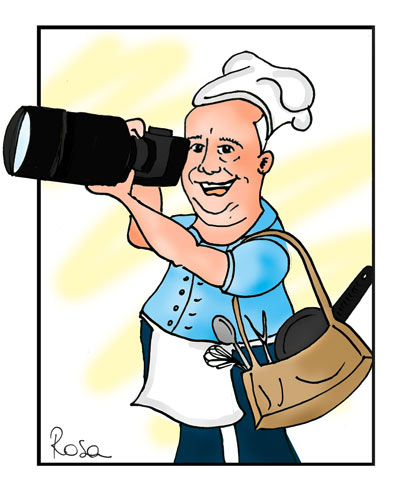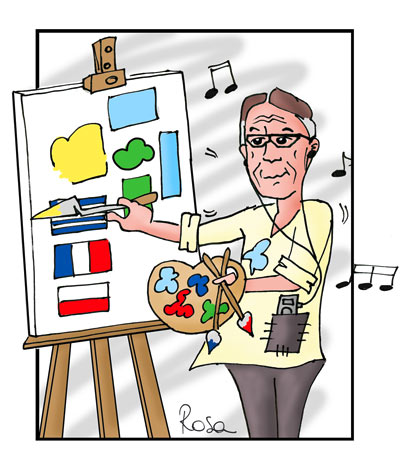International organizations are a place for countries to get together and solve the issues they cannot address alone. Their very existence stems out of a desire to cooperate and find solutions.
“Two roads diverged in a yellow wood,” said the poet Robert Frost. What made you take the path you did?
Michael: I wanted to make the world a better place and give back to those less fortunate than myself. I started by working with refugees, an experience that confirmed this aspiration. I stayed with the UN because, in a global organization that deals with the world’s greatest challenges, there is always room to grow and new projects to lead!
Rob: I have always been curious about the world we live in and how it works. Standardization took hold of my curiosity at the right moment, and I soon realized that this was a place where I could make a difference. Every day I feel lucky that, in my profession, I am part of an organization of 165 countries that are making a pragmatic, positive difference to the state of the world.
Elevator pitch, start now…
Michael: Every 24 hours, the lives of people around the world are touched by the work we do in Geneva. I am spearheading a global effort to turn the substance, relevance and impact of our activities into common knowledge. We need people to better understand how we are collectively working for peace, rights and well-being and how our endeavours make a tangible difference in their lives.
Rob: Great things happen when the world agrees, and that’s what ISO is all about. We bring together experts to share knowledge and agree on solutions to global challenges. Our goal is to be the best at building open and connected communities worldwide to efficiently develop standards that are accessible and trusted by all.
How can we put this information to good use?
Michael: I would like the average person on the street, as well as the policy and decision makers out there, to use this information to make better-informed decisions. Whether this means following global health recommendations to vaccinate children, understanding and exercising basic human rights, protecting the environment, electing leaders, defining policy priorities or even creating the right space for dialogue and debate on key issues. If we all understand their value, we can better invest in the organizations that make them possible.
Rob: My hope is for more people and organizations to get involved in the development of ISO standards in their area of expertise. I would also encourage everyone to check out which ISO standards can help their business or organization, so they don’t lose time reinventing the wheel.
What are the greatest challenges facing the world today?

“We would now like to nominate YOU to do the 'save water’ challenge.”
Michael: I would say climate change, because if we don’t address it, we simply won’t have a planet left to live on!
Another critical issue is managing our global resources. For example, it is not enough to give the underprivileged access to clean water or food, we must also put in place sustainable solutions. We need to strike the right balance between lifting developing regions out of poverty and onto the road to development without compromising other resources in the process.
Rob: We live in a world where our only constant is ever-accelerating change. Our greatest challenge is to manage the risks associated with these changes, while seizing the opportunities.
I agree with the top five risks highlighted by the World Economic Forum in their 2014 report: fiscal crises in key economies; structurally high unemployment/underemployment; water crises; severe income disparity; failure of climate change mitigation and adaptation. Rather than working in isolation, governments, business and international organizations need to come together to find holistic, proactive and imaginative solutions.
How are international organizations like yours helping to solve these challenges?
Michael: The United Nations is at the forefront of all global challenges, responding to urgent needs through humanitarian assistance, public health interventions, peacekeeping operations and refugee protection – to name a few.
We also bring the world together today to find solutions to many of tomorrow’s challenges, such as climate change, disarmament of lethal autonomous weapons – also known as killer robots – and pressing governance issues like transboundary rights agreements, Internet privacy, global health issues, and so on.
More specifically, the UN in Geneva is a key operational centre working concertedly with many other international organizations – including ISO – to make a tangible improvement in people’s lives.
Rob: Our standards represent global consensus on how best to address a particular problem or issue, such as reducing our environmental impact and facilitating global trade. ISO today represents 165 countries. It is our responsibility to act now so that we are not caught out by the risks generated by change, and we can only do that by being practical and relevant.
What do you think the world would be like if these organizations didn’t exist?
Michael: Quite a lot more chaotic than it is now!
Rob: International organizations, operating on the principles of inclusion and openness, are vital in today’s world. If ISO did not exist, trade would be much more restricted as industry would have to contend with different national requirements and less guidance on safe operating procedures for workers and consumers. A lot of resources would be wasted on reinventing the wheel everywhere, and innovation would be more cumbersome.
What is #GenevaImpact?
Michael: #GenevaImpact is an initiative led by UNOG to raise awareness about the impact and relevance of Geneva’s international organizations in the world.
Why is it important that Geneva remains a hub for international organizations?
Michael: International Geneva has become a global cluster for international development, not only because of its organizations, but also because of its people. The city holds a unique pool of professional and technical expertise and has become a well-recognized knowledge hub with a tremendous impact on individual lives worldwide.
The health sector is a case in point. All the main global health actors are in Geneva. From the policy development, research and production of life-saving medicines to the funding and distribution of medication, bed nets and medical assistance, the work and synergies that take place in Geneva reach not only the poorest corners of the world but also benefit the rich. It is crucial to nurture this operational hub so it can continue to serve the world.
Rob: The UN has taken a great initiative by providing a forum where leaders of UN agencies and other international organizations in Geneva can learn about each other’s work and leverage on that.
Having 160+ international organizations in one city makes communication and discussion easier. That said, we need to use this as an opportunity to complement each other in our work to make the world a better place.
For ISO, a concrete example can be seen in the way we collaborate with our two key partners, the International Electrotechnical Commission (IEC) and the International Telecommunication Union (ITU). This three-way partnership is the basis for a number of standards-awareness initiatives and events, and being in Geneva means the CEOs of the three organizations can get together at any time.
Can social media help change the world?
Michael: Social media holds tremendous potential as a platform for communication and change. I suspect we will move into a new media landscape as people become more familiar with how to use social channels to catalyse action and participate on the global decision-making table. I would like to rally people around peace, rights and well-being by linking the work we do in Geneva to their daily lives. We are pushing to showcase what #GenevaImpact does over social networks, and I would love to hear examples of what #GenevaMeans to people around the world.
Rob: Social media has a unique potential to mobilize people in ways that were not possible before because of barriers like distance and time. Anyone in the world with access to the Internet can get together, connect and engage. But using social media for positive change is up to each of us. We have the choice between surrounding ourselves with what we are already comfortable with or taking a peek into other things the world has to offer to challenge our preconceptions and embrace new ideas. For us, social media is a wonderful opportunity for our members to connect with the world, listen to what the world wants, and get more people on board.

“Before getting into the standards world, I started as an accountant in my home country, New Zealand. Less scary things about me include my passion for photography, cooking and travel!”
@ISOSecGen
 “A lot of people know me as a UN diplomat of Danish extraction. In reality, I am close to many cultures, including French, from my mother, Polish, from my grandmother, and Greece, where I have spent many years of my life. This is also my home outside Geneva. Outside work, I am passionate about art, especially contemporary art and music.”
“A lot of people know me as a UN diplomat of Danish extraction. In reality, I am close to many cultures, including French, from my mother, Polish, from my grandmother, and Greece, where I have spent many years of my life. This is also my home outside Geneva. Outside work, I am passionate about art, especially contemporary art and music.”@UNOG_DG

